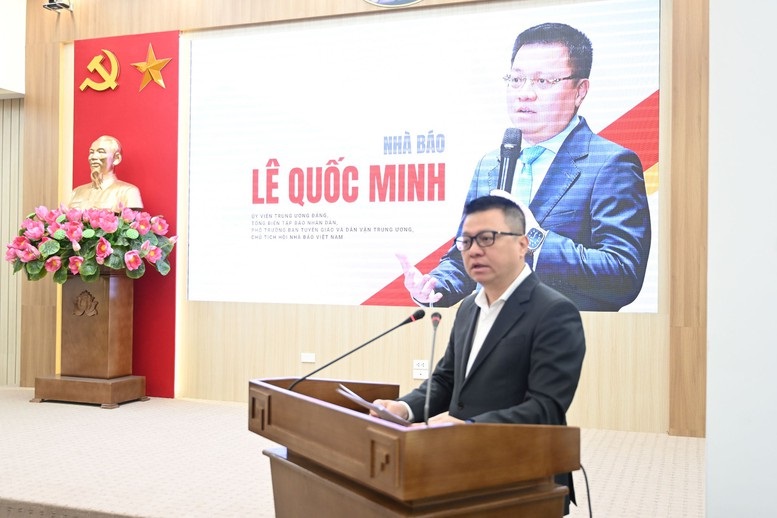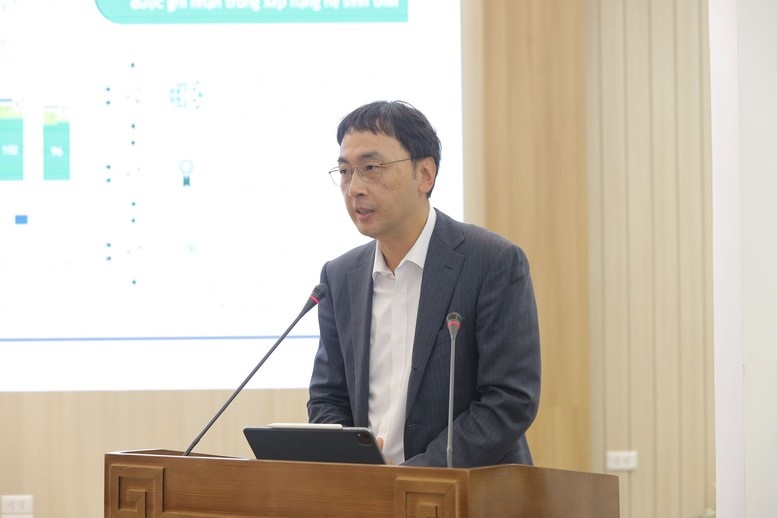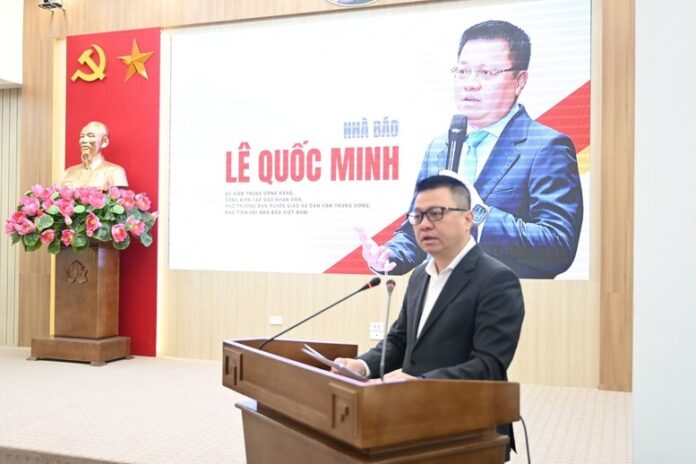Investment Trends in Technology Enterprises
In the era of global digitalization, science, technology, and innovation are not only the driving force but also the key to Vietnam’s development. Resolution No. 57-NQ/TW of the Politburo, issued on December 22, 2024, clearly affirmed: Science, technology, innovation, and digital transformation are the “top priority breakthrough” in the country’s new growth model.
However, to realize this goal, a robust financial system is needed, with the capital market playing a central role – not only providing financial resources but also building investor confidence, developing domestic private enterprises, establishing an international financial center, and making an important contribution to the two-digit growth as directed by the Party and State leaders.

Mr. Le Quoc Minh, Editor-in-Chief of Nhan Dan Newspaper and President of the Vietnam Journalists Association, speaking at the seminar – Photo: VGP/HT
|
Mr. Le Quoc Minh, Editor-in-Chief of Nhan Dan Newspaper and President of the Vietnam Journalists Association, stated: “Developed countries have proven that a strong capital market is the key to promoting innovative and fast-growing technology enterprises.”
Leading technology countries such as the United States, China, and Singapore all have well-developed capital markets, allowing technology startups to raise public capital through initial public offerings (IPOs), thereby creating “unicorns” – companies valued at over USD 1 billion. In Vietnam, despite the strong development of the startup ecosystem, the number of “unicorns” is still limited due to obstacles in support mechanisms, especially capital mobilization. As of the end of 2021, Vietnam had 4 recognized technology unicorns: VNG, MoMo, VNLife (VNPay), and Sky Mavis – ranking third in Southeast Asia, after Singapore and Indonesia.
To turn Vietnam into a center for the development of the digital technology industry, with at least 5 internationally-scaled digital technology enterprises by 2030 as set out in Resolution No. 57-NQ/TW, the seminar focused on discussing practical issues and proposing specific and immediately implementable solutions.
Ms. Pham Thuy Chinh, Vice Chairman of the National Assembly’s Committee for Economic and Financial Affairs, affirmed that Resolution No. 57-NQ/TW has clearly stated that the institution must be one step ahead, creating a foundation for innovation. The National Assembly will continue to improve the legal framework to support technology enterprises in accessing the capital market.
According to experts, to enable Vietnamese technology enterprises to break through, there is a need for breakthrough policies in the capital market. Solutions such as relaxing IPO conditions, establishing a separate exchange for technology companies, and attracting talents will be important steps to help Vietnam become a regional innovation hub.
According to Ms. Nguyen Ngoc Anh, CEO of SSI Asset Management: Vietnam has the potential to become a top destination for foreign investment in technology. Compared to regional countries such as Indonesia, Singapore, and Thailand, Vietnam has many competitive advantages in attracting investment. However, to surpass these countries, we need to pay attention to the changing investment preferences of global funds in emerging markets.
“Foreign investors are interested in Vietnam’s technology market, but they face challenges in finding companies to invest in due to barriers related to IPO and exit strategies. In fact, the listing conditions on Vietnam’s stock exchange require companies to be profitable for two consecutive years, which inadvertently becomes a major obstacle for technology startups.”
“Investors still have concerns about risk factors such as IPO mechanisms and exit strategies. They expect policies to create a more stable market, thereby helping them strategize and build a solid, long-term business model,” said Ms. Nguyen Ngoc Anh.
Many challenges in capital mobilization need to be addressed
Mr. Il-Dong Kwon, Managing Director of Boston Consulting Group Vietnam, highly appreciated the government’s policies in encouraging resources for innovation such as Decision No. 1236/QD-TTg of the Prime Minister: Issuing the National Strategy on Application and Development of Blockchain Technology by 2025, with an orientation towards 2030… These are solid policy foundations to help Vietnam deploy and achieve this important goal.
Moreover, Vietnam has the advantage of a young and tech-savvy population, talented engineers, and a rapid digital transformation pace.
“Areas such as fintech, artificial intelligence, e-commerce, and blockchain have great potential. However, access to capital and exit mechanisms are not really favorable,” said Mr. Il-Dong Kwon.
Next is the aspect of capital, the number of deals and capitalization, and investment activities. It is necessary to remove legal and institutional barriers to create favorable conditions for the development of the capital market.
 Mr. Il-Dong Kwon, Managing Director of Boston Consulting Group Vietnam, highly appreciated the government’s policies in encouraging resources for innovation – Photo: VGP/HT
|
Mr. Il-Dong Kwon emphasized: Building trust is always important, so those who manipulate the market must be punished to show the seriousness of the state agencies in protecting the market and building and maintaining trust.
In terms of human resources, Vietnam has many talented people with strong motivation and aspirations. The key is to attract and retain these talents.
Sharing the same view, Dr. Tran Van, Director of the Institute of Digital Economy Strategy (IDS), analyzed: All forms of capital mobilization can only meet a certain stage when the scale of the startup is still modest. In the development process, startups all aim to raise capital from the public (IPO) and consider this as a measure of success and a milestone marking the maturity of the startup, becoming a complete enterprise that fully contributes to the socio-economic development of the country.
The expert suggested that Vietnam could learn from international markets. Accordingly, countries like China, the US, and Singapore have established more flexible mechanisms to support technology startup IPOs, helping them raise capital more effectively.
“Technology enterprises should be allowed to list without being constrained by the condition of ‘no cumulative loss’, especially on exchanges such as HOSE, HNX, or the International Financial Center,” Dr. Tran Van proposed.
From the perspective of an enterprise operating in the capital market, Ms. Nguyen Ngoc Anh, CEO of SSI Asset Management, revealed that foreign investors consider Vietnam very promising in technology and want to invest in the technology industry. However, they do not have enterprises to invest in and face problems in unlocking the capital of technology enterprises in Vietnam.
First, the nature of technology enterprises worldwide is that they do not have physical assets or real estate. This leads to difficulties in accessing traditional bank loans. This is a significant barrier for technology enterprises in accessing capital.
Second, technology enterprises grow rapidly and have large capital needs, but introducing their potential is a relatively abstract issue for them, creating a barrier that hinders their access to traditional capital sources.
Third, in the early stages, and even for startups in Vietnam at present, they are still in a loss-making situation, although they are highly valued in terms of value and products.
Going back to the story of IPO or listing, in the past years, only 16 enterprises have been listed and registered for trading on the stock market.
Currently, there are 3 exchanges: UPCoM, HOSE, and HNX. For both HOSE and HNX, all have profit-related requirements, which are hardly met by technology enterprises.
– 15:14 19/03/2025
‘Money Flow into the Market is Not Fast Enough to Stimulate Growth’
“Domestic consumption and investment incentives currently contribute over 90% to GDP growth. With exports facing challenges, it is imperative to find solutions to stimulate and unleash these two drivers. However, as Dr. Can Van Luc, a renowned economist, points out, there is a prevailing issue of increasing money supply but slow velocity of money circulation. This results in a lag in the infusion of money into the market, hindering the desired growth trajectory.”
The Next Big Thing: Long An’s $10 Billion Mega-Project Unveiled
The southern province of Long An is set to welcome a new mixed-use residential and commercial project, Thanh Phu, spanning 85 hectares and boasting a total investment of VND 10,662 billion.





















